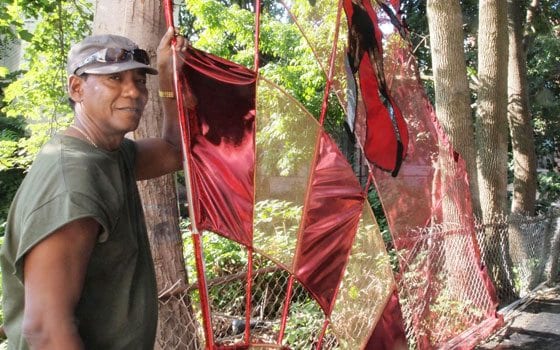
One of Ronald Blaize’s earliest memories is being woken up on the evening of Carnival.
“I was a kid,” Blaize says. “About five years old. My parents say I used to love to see Carnival.”
The images of men and women in brightly decorated costumes and dancing to the thumping calypso beats was too much to miss.
“I ran out to see it and I saw the Indians running up the road,” he says. “I saw Sampson and Delilah. There were Philistines. It had an impact. It took root in my mind.”
Blaize’s love affair with Carnival has stayed with him though several jobs, two marriages and countless costumes, including the winning entry in this year’s carnival, Tsunami, a massive tidal wave-themed costume 45 feet across and 28 feet high.
“I believe it was the biggest costume ever built,” he says.
A master at designing costumes, welding together their frames and dressing them in dazzling fabrics, Blaize is now applying his creative energy to Boston’s Carnival, where he plans to enter a gladiator-themed costume for TnT Social Club’s entry in this year’s competition.
Working with a team of artisans in TnT’s mas camp — an outdoor workshop where costumes are put together — Blaize’s creation is taking shape.
“The theme this year is Survivors of the Arena,” he says. “When they told me that, I reflected on the movie ‘300.’ The soldiers in that movie weren’t in the arena, but I like the colors — the red robes and the bronze. I named this costume the Spartan Gladiator.”
The costume is in pieces in TnT’s mas camp, a paved-over backyard of band leader Errol Phillips’ triple-decker on Glen Road in Jamaica Plain. Pieces of the costumes frame are laid out on large tables.
Two large 18-foot sections, with cutout figures of Greek warriors attached, are stretched out on the asphalt. The whole camp is protected from the rain by a large, 20-foot-high roof.
When finished, the costume will be 18 feet high and weigh more than 100 pounds. The steel frame will ride on three wheels. The dancer is attached to the costume with a harness that fits over his shoulders. When he dances with the costume, the frame tilts back on the two rear wheels so the entire costume can move up and down with his motions.
The costume will be entered in the King and Queen Show next Thursday, Aug. 25 at the Reggie Lewis Center. During this event, a panel of judges flown in from Trinidad will select the official king and queen of the Boston Carnival.
On Saturday, Aug.27 during Carnival, the entire TnT contingent, five sections with dozens of dancers, will compete against other bands, including D’Midas International, Soca and Associates, Dynasty Production and D’Horizon Mas, as they march along the half-mile-long parade route.
The largest costumes are the king and the queen, each of whom performs with a section of dancers with smaller costumes. A band will typically have five sections, each with a slightly different theme and color palette.
In the basement of Phillips’ house, an arsenal of costumes await the dozens of TnT dancers who will fill out the band.
“One of the greatest costume designers, playwright Peter Minshell, said Carnival is like theatre on the streets,” Blaize says. “It really is.”
Boston’s Caribbean Carnival, founded in 1973, is a much tamer version of the Trinidadian Carnival it was fashioned after. In Trinidad, Carnival is celebrated before the beginning of Lent in Februrary. Soca artists compose hit records for the carnival.
And the groups competing in Carnival invest big in their costumes. Blaize says his Tsunami design cost 75,000 Trinidadian dollars, which comes out to $12,000 U.S.
Trinidad’s carnival is only rivaled by that celebrated in Brazil. But, as Blaize points out, the Brazilian costumes aren’t as elaborate as the Trinidadian ones.
“We basically carry the costumes,” he says. “In Brazil, they make floats and put them on a truck and they have women dancing around it. We are a little more innovative the way the dancers portray the costume.”
Blaize, who worked his entire life in the marine industry, remembers one incident where his boss at Petrotrin, the nation’s petrochemical company, complained of his weeks-long leave from work he used to design and build carnival costumes.
“They said it was affecting my job,” says Blaize, who worked as marine operations coordinator for the firm.
Blaize took his case to Trinidad’s minister of culture, who got the Trinidadian government to intervene on his behalf.
“They couldn’t stop me because of government intervention,” he says. “But I couldn’t get a promotion after that. They said all I think about is Carnival. They were right. My love for the art kept me afloat.”
Blaize, who has since retired, now works unencumbered by bosses. His designs have won numerous first place awards in recent years both in Trinidad and at Trinidad-style carnivals here in the U.S.
Working in the TnT mas camp, Blaize says he finds relaxation amid the chaotic assemblage of fabric, steel, fiberglass and glue.
“This is therapy,” he says. “There is so much to do, but you have one picture in your mind. Nobody else really sees it. They see the pieces. You have to hold that vision. At the end, you see it and you say ‘aah, that’s it.’ ”







